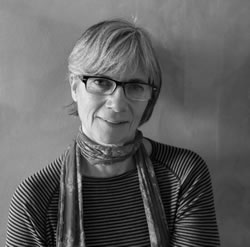|
It had been a bad day.
In Math class I had dreamed up stories of a + b = c, no numbers involved. My teacher was not amused.
In History I was told to stick to the facts.
In English I was informed that, no, my poems did not constitute a suitable response to the essay question on the test.
In Art, I couldn't draw a hand to save my life, but it wasn't okay to fill the paper with words about hands.
And the bulletin board in the hall (and everyone clustered in front of it) let me know that I didn't get a part in the play. Not even a silent one.
As I made my way home, I thought, well, at least I had the piano, at least Mr. Goetze had encouraged me with his "Yes, we sweep the cobwebs from your closet. Bach is at last becoming Bach."
So deep was I into replaying the miserable day that I didn't notice my mother standing at the back door, leaning against it, a bag of groceries at her feet, until she was waving me over and mouthing "Ssshhhh…" I tiptoed up the steps. And then there. I heard it. Faint at first but louder now—from just inside. Jazz of a sort. Tumbling from our piano in a floaty rippling. Sounds moving like grasses in the wind. Like animals. Like water. Like weather.
How could it be? Who could it be?
The music flew as though the player's life depended on it. Understanding flooded me. Shook me. Wrapped its arms around and pulled me under.
My mother motioned for me to slide up to the side window and sneak a peek.
There. There at the piano. My brother. My brother?
My brother who had quit piano lessons years ago.
My brother who snapped surly sarcasm whenever I tried to listen to music.
Who rolled his eyes when I sat down to practice.
He had a secret. A big one. This.
I looked at my mother.
"I quit," I said. "No more lessons."
"Okay."
"It's no use. A lie."
"Okay."
"Okay?"
She nodded. "He plays every day. For hours. Just because."
I climbed the stairs to my room and closed the door and did the only thing I knew to do: sit at my desk and move words around sheets of paper again and again, again and again to see what they did to one another—their sounds their meanings their patterns their soft spaces and hard shapes again and again and again deep into the night, night after night.
A week or so later at school my luck turned. Or so I thought. My English teacher asked us to write a piece of short fiction. At last. In my story a teenaged girl finds her grandmother's body washed up on shore. The family comes apart. The writing was restrained, the story told straight. Fierce and tender. I was in love at the time with Raymond Carver's sort of minimalism. I was going for broke.
The day after I turned it in, my father—who taught history at said secondary school—called me into his study and asked how I could possibly say those things, tell those lies about his mother—it was all over school. He was upset. I was puzzled. Said something brilliant like "Huh?" Apparently my teacher had rushed up to him in the hall to express his deepest condolences on the tragic death of my grandmother. And my father probably said something brilliant like "Huh?"
My parents were hurt. Astounded. Mad. I was hurt, astounded, furious.
People, it was a short story. Made up. F-I-C-T-I-O-N.
But secretly, I was glad. I was onto something. I had found my piano.
Soon after, I stumbled onto Toni Cade Bambara's "A Sort Preface" to her short story collection, Gorilla My Love, a brilliant riff that opens: "It does no good to write autobiographical fiction, cause the minute the book hits the stand, here come your mama screamin how could you and sighin death where is thy sting…" And I found Ron Carlson and his: "I always write from my own experiences whether I've had them or not." And as often as I could, I made sure to sit on the porch beneath the window and listen to my brother play.
These lessons have stayed with me through the writing years—write close to the bone, write with everything you've got, and make people believe, whether it's true or not.
| 

